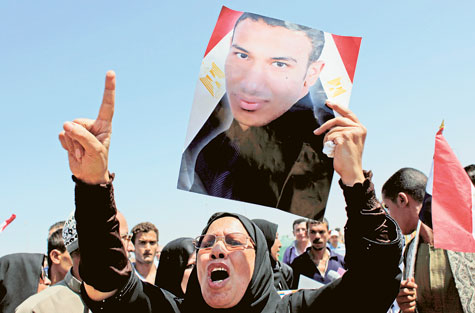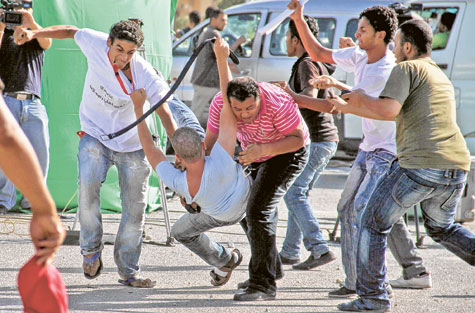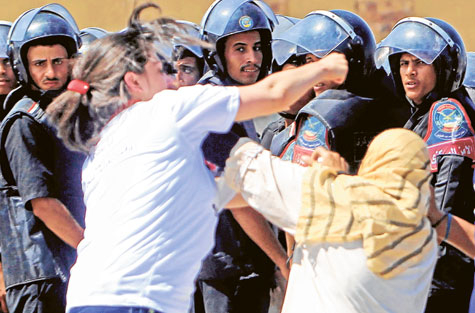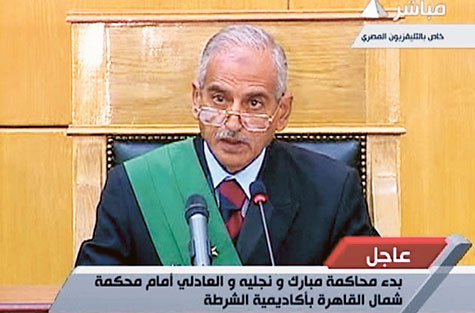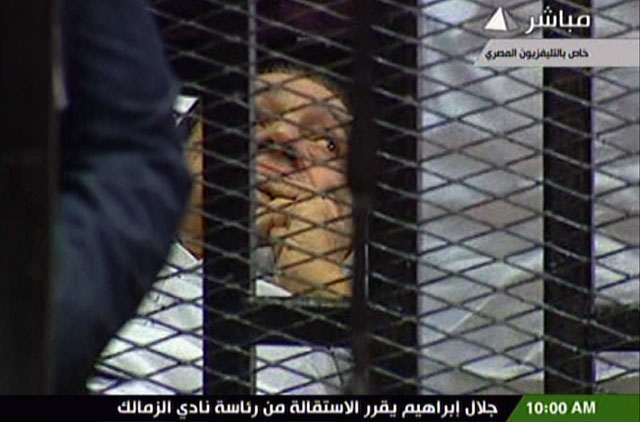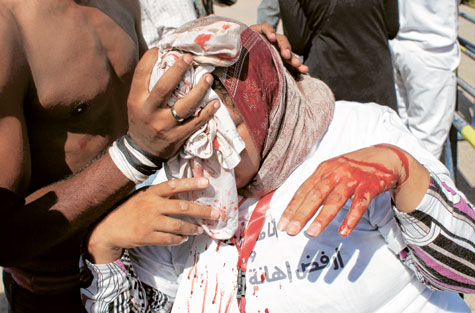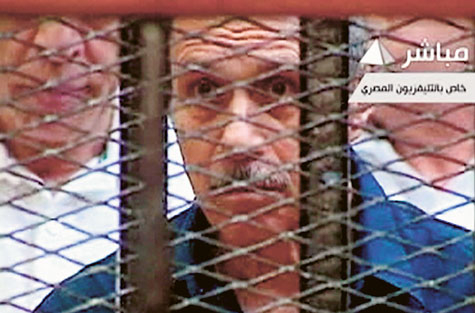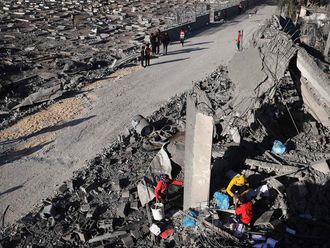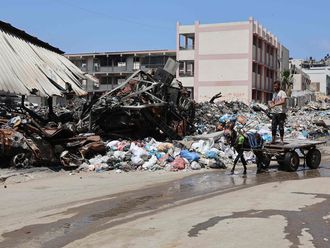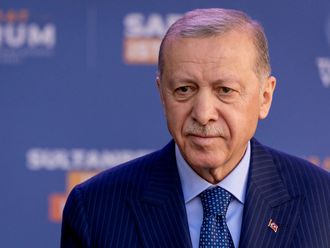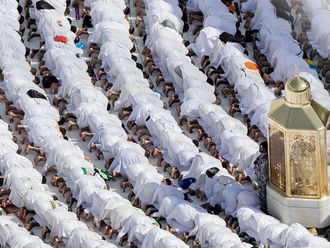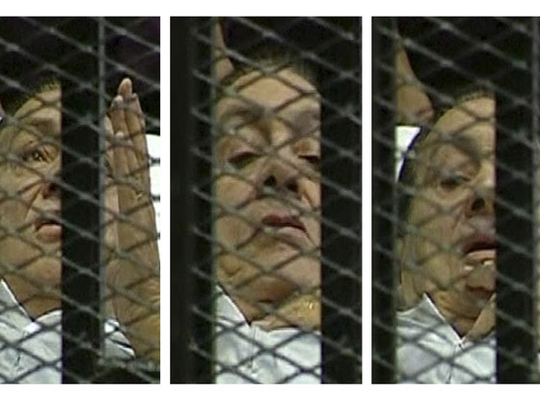
Dubai: Social media was abuzz with live updates of the trial of former Egyptian president Hosni Mubarak earlier today, but as is the case with live tweets, it also included much of the flavour and mood surrounding the historic event.
Every move made by Mubarak, his son’s Alaa’ and Jamal as well as the reviled former interior minister Habib Adly, was closely followed, analyzed and tweeted by those following the court proceedings. A twitter user even read Gamal Mubarak’s lips, saying “I can’t hear” as he rolled his eyes.
- In pictures: Mubarak on trial
- Hosni Mubarak: Rise and fall
- Hosni Mubarak — Egypt’s fallen long-time pharaoh
Mubarak’s brief nose-pick during the trial was picked up on and made fun of by twitter users, who distributed a zoomed in picture on the social networking site.
The Arab-Brazillian revolutionary political cartoonist, Carlos Latuff, who has taken up the cause of the Arab Spring, was quick to draw a caricature of Mubarak lying in bed with a film director sitting across from him in a lawyer’s chair. He tweeted: “Ok #Mubarak, now play VICTIM!”. The caricature had over 10,000 views within forty minutes of being posted.
Others commented about the mood in Cairo as the former president was being tried.
Nadia abou el-Magd (@Nadiaglory), a journalist with Al Jazeera English observed: “radio masr is playing sort of national songs that [Mubarak’s National Democratic Party] used to play @ its annual conferences”.
Some twitter users, or tweeps, criticized Arab television channels that did not break regular coverage to tune into the live court proceedings.
Palestinian cartoonist Masha’el (@MishaaCartoon) said: “Saudi channel 1 continues to discuss Ramadan and diabetes while the rest of the world’s attention is turned towards the trial of the tyrant Mubarak.”
A large number of Arabic channels, including non-news channels from various countries broke regular programming to air the proceedings live.
Others however criticized what they saw as the Mubarak trial’s monopolization of the news agenda. One tweep wrote: “still no mention of people dying in Hamah [Syria] today”. Others feared that the Assad regime in Syria would use the distraction as an opportunity to intensify the violent crackdown on pro democracy protesters, and repeatedly reminded other internet activists not to neglect Syria.
The court proceedings’ regular interruption by lawyers shouting over one another became a target of jokes and mockery by social media users.
When the judge succeeded in restoring order, Kuwaiti tweep Ghalia Al Dhafairi (@ghalyyaa) wrote: “They finally managed to get all the lawyers to sit down. Looks like we’re watching the live stream of an elementary school!”
Highlighting the apparent entertainment factor of the trial, a twitter user even suggested that snacks should be sold during recess.
Some pointed out the irony that the former president was being tried in the very police academy that was named after him, as many other state institutions were.
While a few expressed sympathy upon seeing Mubarak wheeled in on a stretcher, other tweeps were quick to remind them of what they considered to have been crimes committed by Mubarak, disseminating videos of alleged Mubarak era state sponsored violence against protesters during the revolution.
Some decried Mubaraks arrival on a stretcher as a “façade” and as an “act” to gain sympathy while others tweeted that “Israel and Saudi Arabia are most distressed” at the trial.
Nevine Henein (@BeeboHenein) a twitter user from Cairo said: “If he [Mubarak] considered himself competent to govern then he’s certainly competent to stand trial. The age issue works both ways”.
Egyptian twitter celebrity Mahmoud Salem (@sandmonkey) taunted Mubarak supporters: “To every Mubarak supporter who said they would rather kill themselves than to see him tried..well..we are waiting. :)”
Charges against Egypt's Mubarak detailed in court
A prosecutor detailed charges on Wednesday against Egypt's ousted leader Hosni Mubarak, accusing him of complicity in the killing of protesters during the uprising against his rule and of corruption in accepting gifts to facilitate a land deal.
Mubarak denied the charges, as did his sons, Gamal and Alaa, who were also accused in the corruption charges.
Under the top charge, read out by chief prosecutor Mustafa Sulaiman, Mubarak was accused of conspiring with his security chief, former interior minister Habib Al Adly, to commit the premeditated murder and the attempted murder of protesters. The crackdown on the 18-day wave of anti-regime demonstration killed 850 protesters, before Mubarak was forced to resign on February 11.
The charge carries a possible death penalty.
Sulaiman said Mubarak incited members of the security forces to shoot at peaceful protesters and run them over with police cars with the intention of killing them, and "allowed (Al Adly) to use live ammunition."
He said Mubarak "agreed to the continuation of attacks against them (protesters) without intervening." The aim, Suleiman charged, was to kill some protesters so that "the rest are forced to disperse and abandon their demands so he can protect his job and continue to rule."
Among the dead were minors, the prosecutor said.
In the corruption charge, Mubarak and his sons are accused of accepting five villas worth nearly $7 million in Sharm Al Sheikh from prominent businessman Hussein Salem, a family friend.
In return, Mubarak used his influence with the governor of South Sinai, where Sharm Al Shaikh is located, to ensure Salem could buy prime real estate in the town at a vastly reduced price to build a resort complex, according to the charges. Salem is a co-defendant with the Mubaraks, but is being tried in absentia. He is currently under arrest in Spain on money laundering charges.
Mubarak faces another corruption charge for allegedly conspiring with his oil minister and Salem on a natural gas export deal with Israel.
The gas, said Sulaiman, was sold to Israel at prices lower than world levels, costing the Egyptian treasury $714 million in lost revenues. The export contract was awarded to Salem without a tender, the prosecutor said, and he stood to gain some $2 billion.
Key dates
- May 4, 1928: Born in the Nile Delta village of Kafr Al Moseilha.
- April 1975: Chosen by President Anwar Sadat to be vice-president.
- October 14, 1981: Sworn in as Egypt's president following Sadat's assassination.
- June 26, 1995: Survives assassination attempt while visiting Ethiopia.
- 2003: Collapses during a speech to parliament, blamed on a combination of cold medication and fasting during Ramadan.
- 2004: Undergoes a minor back operation in Germany.
- February 2005: Orders constitutional amendments that pave the way for first-ever multi-candidate elections.
- March 2005: Hundreds participate in protests to oppose a fifth term for Mubarak or plans to let his son Jamal succeed him.
- September 7, 2005: First multi-candidate presidential election is held. Mubarak wins. He is sworn in fifth consecutive term several weeks later.
- March 6, 2010: Undergoes gall bladder surgery in Germany.
- November 28, 2010: Parliamentary elections held which opposition parties say are marred by fraud.
- January 25, 2011: Thousands of anti-government protesters in Cairo stage the biggest demonstrations in Egypt in years.
- January 28, 2011: Mass protests rock Cairo and other cities. Mubarak orders the army out on the streets to restore order.
- January 29, 2011: Mubarak appoints first vice-president, Omar Sulaiman, in a bid to appease protesters. A wave of looting grips Egypt.
- February 1, 2011: Promises not to seek re-election but says he will serve out the last months of his term and ‘die on Egyptian soil.'
- February 10, 2011: Refuses to leave office and hands some powers to VP in state TV appearance that leaves protesters furious.
- February 11, 2011: Resigns and hands power to the military after protesters flood the streets of Cairo and other cities.
- April 13, 2011: Detained along with his two sons for ordering the use of lethal force against protesters and corruption.
- June 1, 2011: Egypt's top prosecutor announces August 3 as date for start of Mubarak's trial.
- July 14, 2011: Mubarak denies responsibility for the killing some 850 protesters by his security forces, during Egypt's uprising, according to a published transcript of his interrogation.
- July 26, 2011: Mubarak's chief doctors say he has refused to eat for four days, has lost weight and is weak. Still, days later, the health minister pronounces him fit to attend trial.
- August 3, 2011: Mubarak is wheeled into a Cairo courtroom lying on a hospital gurney as his trial starts on charges of corruption and ordering the killing of protesters.


